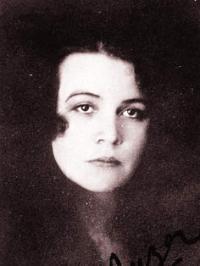Beautiful, smart, talented and a bit exotic, Elisaveta Bagryana is the brightest star on the Bulgarian cultural horizon, one of very few women. Sensitive and frail, she nevertheless proved incredibly resilient in asserting her name, coming out winner in the difficult battle for emancipation. She polarized public opinion on numerous occasions, her flight of fancy tearing down the barriers of convention and prejudice and taking her to uncharted waters.
Elisaveta Bagryana’s life spanned several turbulent periods in Bulgaria’s history, conquering the hearts of millions of readers in Bulgaria, but also in Slovenia, Poland, the Czech Republic, Russia, Serbia, France, Romania, Italy, Sweden. She has three nominations for the Nobel prize in literature. Her life was like Halley’s Comet that comes once in a lifetime, yet the flame of her literary talent illuminated Bulgarian literary horizons twice – once at the beginning and once in the twilight of her career.
Elisaveta Bagryana never looked for the meaning of things somewhere else, in some hidden recesses of other worlds. Born and raised in Sofia, she graduated Slavic studies and it was at university that she met writers Dimcho Debelyanov, Dimitar Podvurzachov, Hristo Yassenov, Yordan Yovkov. When she graduated in 1915, Contemporary Thought magazine printed her first poems. But where is her love of poetry rooted?
 “I first felt the spark of poetry come to life when I was 14. At the time I was at the secondary school in Veliko Turnovo,” says Elisaveta Bagryana in a recording from the Bulgarian National Radio’s Golden Fund audio archives. “Being a clerk, my father was transferred from Sofia to Turnovo and our large family with him. It is a town of incredible beauty – with the meandering river Yantra, with its green hills, covered in violets and lilacs and filled with nightingale song in springtime, with its houses that seem to be climbing on top of each other; from afar it looked like a stage set. All this got my adolescent imagination and sensitivity going without my even knowing it and that was when I put pen to paper and wrote my first school poems. But I think I started writing real poetry after 1920…”
“I first felt the spark of poetry come to life when I was 14. At the time I was at the secondary school in Veliko Turnovo,” says Elisaveta Bagryana in a recording from the Bulgarian National Radio’s Golden Fund audio archives. “Being a clerk, my father was transferred from Sofia to Turnovo and our large family with him. It is a town of incredible beauty – with the meandering river Yantra, with its green hills, covered in violets and lilacs and filled with nightingale song in springtime, with its houses that seem to be climbing on top of each other; from afar it looked like a stage set. All this got my adolescent imagination and sensitivity going without my even knowing it and that was when I put pen to paper and wrote my first school poems. But I think I started writing real poetry after 1920…”
The poetic road Bagryana traveled was a long one, filled with different artistic quests and transformations, but it was the first time in Bulgarian literature that woman fearlessly revealed her nature. She loved traveling and found high places and high speed intoxicating. Her pulse beat to the rhythm of the times she lived in but her feet were firmly planted on the ground, her roots deep in the national spirit and life itself. Her name sparked off many controversies because she never hesitated to uphold her opinion or the way she looked at things, though she was not always understood or accepted. One such instance was in 1940 when she got involved in the rescue of Bulgarian Jews from Nazi concentration camps, another – the cause she took up together with another poetess – Dora Gabe – for the liberation of Southern Dobroudja. Elisaveta Bagryana stood up in defence of poet Nikola Vaptsarov at his trial, unfortunately to no avail. She was also involved in the efforts to save publicist Delcho Vassilev from being sent to concentration camp after the 9th of September 1944 communist coup. Hanging between myth and reality, the life of the poetess spanned almost 100 years – from the close of the 19th until the end of the 20th century. Elisaveta Bagryana – the one and only, the eternal, passed away in 1991.
English version: Milena Daynova
Bulgaria had no Prague Spring, no Tender Revolution, no Solidarity movement, nor huge dissidents like Havel and Wałęsa. The main reasons are the psychology of the Bulgarian people and the repressions against the intellectual elite..
Reciting his poem An Interview in the Whale's Womb, Pavlov went on to say: „To enter the whale's womb you should prove you've got worth. There is 'worth' control… There I first met Valery Petrov, and say, Boris Hristov met me…”..
“Europe in anything other than the geographical sense is a wholly artificial construct.” Sobering words, especially coming from Margaret Thatcher in her book Statecraft. In the 1980s, the Iron Lady dragged Britain out of the..

+359 2 9336 661
